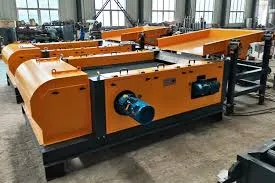

Dec . 17, 2024 00:12 Back to list
The Importance of Scrap Metal Plants in Today’s Economy
In the modern era, where sustainability and resource management have become paramount, the role of scrap metal plants is more crucial than ever. These facilities serve as the backbone of recycling operations, converting discarded metal into valuable raw materials that can be reused in various industries. The process not only helps in conserving natural resources but also significantly reduces environmental pollution and energy consumption.
The Process of Scrap Metal Recycling
Scrap metal plants operate by collecting, sorting, and processing scrap metals. The initial step involves gathering metals from various sources such as construction sites, automotive junkyards, and manufacturing waste. Once collected, the metals are sorted into ferrous (containing iron) and non-ferrous categories. Common ferrous metals include steel and iron, while aluminum, copper, and brass fall under the non-ferrous category.
After sorting, the metal is cleaned and prepared for melting. In this stage, contamination from non-metal materials is removed to ensure the purity of the recycled metal. The cleaned metal is then fed into a furnace where it is melted at high temperatures. Once melted, the liquid metal can be poured into molds to create new products or can be cast into ingots for further processing.
Economic Benefits
Scrap metal plants play a vital role in the economy by not only providing jobs but also boosting the profitability of various industries. The recycling of metals reduces the need for mining new materials, thereby diminishing the operational costs associated with extraction, transportation, and processing of raw metals. This ultimately leads to lower prices for consumers and contributes to a more stable economy.
Furthermore, these plants generate income from the sale of recycled metal to manufacturers who seek cost-effective materials. This demand encourages innovation in recycling technologies, further enhancing the efficiency of scrap metal processing.

Environmental Impact
One of the most significant benefits of scrap metal plants is their positive environmental impact
. Recycling metal conserves energy; for instance, recycling aluminum saves about 90% of the energy required to produce new aluminum from raw bauxite. This conservation not only reduces greenhouse gas emissions but also lessens the ecological footprint of metal production.Additionally, scrap metal recycling helps to minimize landfill waste. The accumulation of scrap metals in landfills can lead to soil and water contamination due to the leaching of harmful substances. By diverting these metals from landfills, scrap metal plants contribute to cleaner environments and promote sustainability.
Community Engagement and Awareness
Moreover, scrap metal plants play a pivotal role in raising awareness about recycling practices in local communities. Many plants engage in community outreach programs to educate the public on the importance of recycling and proper waste disposal. By encouraging individuals and businesses to participate in recycling initiatives, these facilities foster responsible consumption and waste management practices.
Conclusion
In conclusion, scrap metal plants are essential to the fabric of our economy and environment. They promote the recycling of valuable materials, generate economic opportunities, and contribute to ecological sustainability. As the demand for sustainable practices continues to grow, the significance of scrap metal recycling will undoubtedly increase. By supporting and investing in scrap metal plants, we can pave the way for a greener and more resource-efficient future.
Latest news
Troubleshooting Common Eddy Separator Problems
NewsJul.04,2025
The Role of Metal Recycling Plants in Circular Economy
NewsJul.04,2025
The Impact of Recycling Line Pickers on Waste Management Costs
NewsJul.04,2025
Safety Features Every Metal Shredder Should Have
NewsJul.04,2025
How Industrial Shredders Improve Waste Management Systems
NewsJul.04,2025
How Cable Granulators Contribute to Sustainable Recycling
NewsJul.04,2025